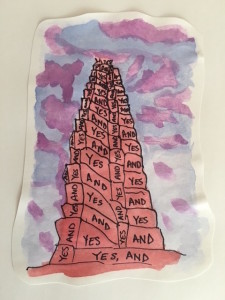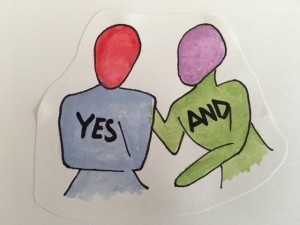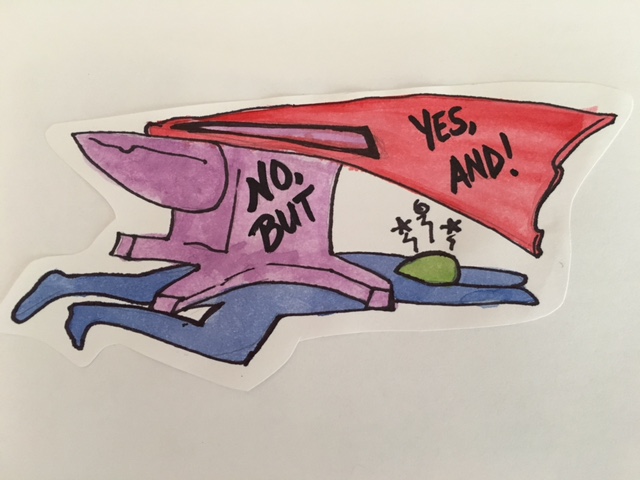Yes, And – the well-known cornerstone of improvisational theater where you accept what another offers and build on it with your own contribution– is permeating business and leadership development programs.
As a professional improviser, I love that. From my first days improvising in high school I knew that the improviser’s mindset was my preferred way of living. It’s a commitment to believing that people have gifts to offer. And that your seeing those gifts and working with them will produce an outcome far more interesting and useful than you could drive on your own.
True, vibrant success is created in the present moment through powerful connection with other people which enables you to bob and weave in the face of anything that comes up.
This is true. And…
So many workshops – with the best of intentions – are teaching lifeless phrasing that participants are – again, with the best of intentions – directly applying. So much so that the value of the application risks being lost in the cliché that it’s cloaked in.
This happens in the obvious instances when the “Yes, And” comes with the spirit, tone or posture of a “No, But” (“Yes, we could close the office on Fridays in the summer. And, we could irritate the hell out of our stakeholders, too.”).
The value’s also lost when someone slices the gift of the other person so thinly as to only accept a thread of what was offered under some misguided belief that one must agree and therefore must find something to say yes to…even if the insignificance of that thing does more harm than good. (“Oh! You think we should step back to consider the bigger picture, re-prioritize our projects and consider workload according to a new timeframe? Yes, let’s look at the calendar again. And I’d like it one week earlier.”)
This devaluing also happens when the dutiful workshop participant is merely going through the motions of applying  his or her new terminology without really listening to the person behind the comment offered. So often we don’t truly seek to find the gift in the comment or really let the other person’s contribution through our filters before crafting a response. (“You think we should cater next week’s event? Yes, and we should also change the format of our staff meetings.”)
his or her new terminology without really listening to the person behind the comment offered. So often we don’t truly seek to find the gift in the comment or really let the other person’s contribution through our filters before crafting a response. (“You think we should cater next week’s event? Yes, and we should also change the format of our staff meetings.”)
I offer these abbreviated examples as review because I’m sure you’ve experienced them in your everyday lives. You likely have first-hand knowledge of the impact achieved when the tool is applied with a lack of sincerity.
So how might we all stretch to live into the spirit of Yes, And, to embody it in our every interaction?
The first step is overcoming the fear of it. Yes, And doesn’t have to mean “I agree with everything you’ve said.” It doesn’t have to be “I’m committing to your proposed course of action” and it doesn’t have to be a cheesy application of overused terminology.
Yes, And can be used effectively in the idea-generating, heightening way that it’s applied in improvisational theater, or it can be used as a way of reaching out, of building connection before beginning to craft what you’d like to create together. It is equally rooted in possibility and in openness – both to others and to ourselves.
It can be:
“I hear you. And this is my experience.”
On the surface, this risks being flippant, but when grounded in the pure spirit of Yes, And, the first part of the equation is deep empathetic listening. Only then can you truly acknowledge the other person’s experience with your words and with your energetic engagement. This integrity of spirit is what allows the textbook conflict management question of, “Can I share where I’m coming from?” to be well received. People don’t want to be made to feel heard. They want to be heard.
“I’m holding two seemingly competing truths simultaneously.”
Life rarely presents us with strictly either/or decisions. In identifying multiple simultaneous truths, we are better able to find a middle path. We recognize the complexity, while also seeking possibilities for what we might create in future. On a personal level, this helps us honor past struggle, and also move forward. In the face of black and white thinking, Yes, And can get you unstuck.
 “There’s learning there. And you’re being pretty hard on yourself.”
“There’s learning there. And you’re being pretty hard on yourself.”
Many of us have been conditioned to believe that the best means of spurring behavior change is correction or punishment, and nowhere is that aggressive parent voice unleashed with more vigor than in our own minds. Despite all my years doing improv, I think I most often use Yes, And when working with high-achieving clients who berate themselves for every misstep in an attempt to grow and improve. Yes, you may have snapped at your kids this morning or had an egregious grammatical error in that important PowerPoint. And, you’re working and striving for increased awareness. There is learning in our failures – if we remain open to seeing it. To paraphrase Brené Brown, we are imperfect AND we are worthy of love. We mess up AND we are capable of change.
“I understand you disagree. What are your suggestions?”
If posed in an authentic spirit of Yes, And, this comment isn’t a challenge, a gauntlet thrown dismissively into a disagreement. Instead it reflects appreciation for raising the issue and empowerment of the individual to propose ideas to mitigate his or her personal concerns. The Yes here is open-heartedly acknowledging the differing view, really hearing it. The And is your willingness to move forward in light of that acknowledgment – rather than shutting down discussion or sidestepping the concern.
“I’m so glad you said that. You’ve given me a new way to look at this.”
You might completely disagree, but the other person’s speaking his or her mind gives you insight into where that person – and likely others – are coming from. This invocation of Yes, And lets people know that you appreciate their taking the risk of speaking up. It illustrates that you’re committed to having the conversation that really needs to take place, rather than talking around it with the superficiality of presumed agreement. Holding an intention of accepting and building on others’ contributions can help you be open to and grateful for their candor.
Whatever the words you use, if you practice shifting your energy, disposition and perspective to the spirit of Yes, And, you’ll find your relationships becoming much more rich. Suddenly expansive opportunity to collaborate, new ways of looking at things and far more original and gratifying results will face you at every turn.
Yes, And is not just a tool to be applied, it’s also a way of being in the world. It’s a responsible way of being in relationship that attracts others to us, rather than holding them at arms’ length.
Genuinely living into the spirit of Yes, And leads relationships to deepen and become more meaningful as you see possibility in each of your interactions and are met with increased support. Not only do you not have to do everything alone, but you’ll also have more fun and get better results when you genuinely engage with others.
It’s a meaningful exercise; and it’s a fulfilling, respectful way to live.

